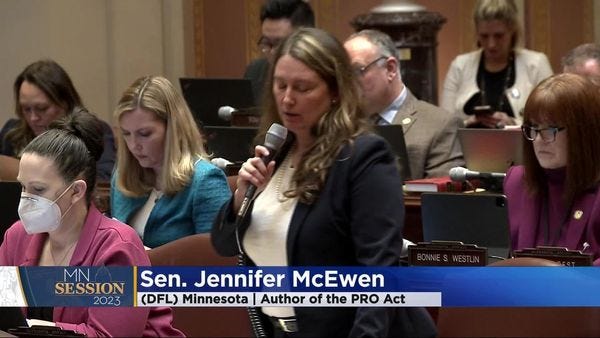Minnesota Enshrines Reproductive Rights Into The Law
Republicans say it's 'too extreme,' so you know it's good.
This weekend, the Minnesota Senate voted 34 to 33 to pass a truly great bill enshrining reproductive rights in the state's law — and not just the right to have an abortion, either — making it the first state in the post- Dobbs era to secure access to abortion through legislative action.
The PRO Act, which will hopefully become model legislation for every state wishing to ensure its residents have continued access to reproductive rights, states that "every individual has a fundamental right to make autonomous decisions about the individual's own reproductive health, including the fundamental right to use or refuse reproductive health care" and that "[every] individual who becomes pregnant has a fundamental right to continue the pregnancy and give birth, or obtain an abortion, and to make autonomous decisions about how to exercise this fundamental right."
The right to abortion in Minnesota is already guaranteed by a 1995 state Supreme Court ruling, but we all know how that can go. By cementing it in the law, the state prevents the chance that another, more conservative state Supreme Court could just go ahead and overturn that ruling.
Importantly, the bill is also clear that Minnesota residents don't just have the legal right to an abortion but the right to obtain an abortion. The fact is, even before Dobbs , there were many, many areas of the country where it was basically impossible to obtain an abortion — and a right isn't really a right if you can't exercise it. It's not clear yet how the state intends to ensure access, but this is certainly a step in the right direction.
What's also really great about this bill is that it doesn't just guarantee the right to access abortion but the right to "use or refuse reproductive health care" in general.
For purposes of this section, "reproductive health care" means health care offered, arranged, or furnished for the purpose of preventing pregnancy, terminating a pregnancy, managing pregnancy loss, or improving maternal health and birth outcomes.
Reproductive health care includes, but is not limited to, contraception; sterilization; preconception care; maternity care; abortion care; family planning and fertility services; and counseling regarding reproductive health care.
This is all very important. This is what we talk about when we talk about reproductive justice. My hope is that there will also be funding to ensure that people are able to access these rights and this health care regardless of their economic situation.
Opponents of the law pitched a fit, naturally, with many of them zeroing in on the part of the bill that secures a right to sterilization, citing fears that teenagers will for some reason flood doctors' offices demanding hysterectomies. Clearly, they forgot about the part where these things are a decision between patient and doctor, and most doctors are unwilling to perform such procedures on teenagers (or even those of reproductive age) barring medical necessity.
“This bill would not only allow for a young girl to get an abortion, but to go in and be sterilized,” Rep. Anne Neu Brindley, R-North Branch, said while the bill was being debated. “This bill doesn’t address the safety of those little girls.”
“Today we are not just codifying Roe v. Wade or Doe v. Gomez as the author has indicated,” Senate Minority Leader Mark Johnson, R-East Grand Forks, said. “We are enacting the most extreme bill in the country regarding youth sterilization, late-term abortions and public viability for a vast array of new reproductive rights.”
To be clear, "late-term abortions" are not a thing. It is an inaccurate term used to refer to second trimester abortions, not third. These are abortions performed after 13 weeks. No one is performing third-term, post-viability abortions without a serious medical reason for doing so.
The bill now heads to Democratic Gov. Tim Walz's desk, where it will be signed and enacted into law. Hooray!
Do your Amazon shopping through this link, because reasons .
Wonkette is independent and fully funded by readers like you. Click below to tip us!




No wonder they voted in a Democratic majority, after that.
The homicide rate in Mississippi is significantly higher there, as well. God must want the MAGAts to murder each other. It's significantly higher, like 25%, in Louisiana, Alabama and Missouri, as well as MS, all blood-red states. My source is Thom Hartmann, who was quoting a study by The Third Way.https://www.thirdway.org/re...